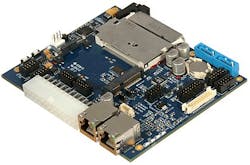Rugged COM Express carrier card for defense, aerospace, and transportation introduced by Acromag
WIXOM, Mich., 26 Oct. 2012. Acromag in Wixom, Mich., is introducing the rugged ACEX4405 COM Express carrier card for defense, aerospace, industrial automation, transportation, and medical applications. COM Express is an embedded computing standard that balances size, performance, I/O, thermal, and scalability.
The ACEX4405 embedded computing carrier card hosts Type 2 or Type 3 COM Express modules that measure 95 by 125 millimeters, and have extra-rigid circuit boards and extended temperature support.
Features include dual ports for Gigabit Ethernet, RS232/422, and USB. A mini PCI Express slot adds high-speed I/O capabilities. Locking and latching connectors prevent shock or vibration from loosening cables.
Users can select from several processor modules and pair them with a carrier card that meets their application's I/O requirements. The ACEX4405 includes dual SATA connectors, audio, and VGA video interfaces. The board also has a standard ATX power connector with LEDs for power and status indication.
Story continues below
Related stories
3U VPX data storage module for any CPU introduced by Acromag Xembedded
Rugged I/O specialist Acromag boosts expertise in military embedded systems with acquisition of Xembedded
PMC cards based on Xilinx Spartan-6 FPGA introduced by Acromag for signal processing applications.
The carrier provides an optional fan power interface for additional cooling. Scalable data storage is accommodated by a CompactFlash socket with ejector. LVDS ports are available for LCD panel display and LCD backlight control.
For more information contact Acromag online at www.acromag.com.

